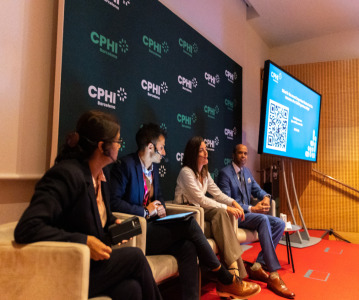Private health insurance uptake boosted by COVID-19 in MENA region, says latest Fitch report

New report from Fitch Solutions points to greater consumer awareness of health insurance benefits in MENA region amid pandemic crisis and assesses individual countries' progress in vaccine procurement and rollout
The COVID-19 pandemic will boost the uptake of private health insurance across the Middle East and North Africa (MENA) region, according to analysts at Fitch Solutions.
In a new report published January 12th, Fitch says health insurance will particularly see strong growth across the Gulf Cooperation Council (GCC) as the impact of coronavirus helps to drive demand.
“In the UAE and Saudi Arabia, where the implementation of mandatory cover has already boosted demand in recent years, greater consumer awareness of the importance and potential benefits of health insurance cover is likely to further increase as a result of the pandemic,” the report says.
The Fitch analysts say this development will increasingly be seen as a boost for the private healthcare sector in the region, which is becoming progressively more involved in healthcare funding.
What is more, as governments seek to reduce their involvement in the provision of medical services, the uptake of public-private partnerships will proliferate across the region, according to the Fitch report.
However, despite the growth expectations, the report warns that health insurers across the GCC will face a profit squeeze due to premiums struggling to keep pace with rising medical claims.
Varied access to COVID-19 vaccines
The report also highlights the issue of varied access to COVID-19 vaccines across the MENA region, with initial supply likely to be skewed towards wealthier countries in line with advance purchase agreements given the commercial approach taken by the vaccine developers which will be first to market.
Breaking down the MENA region into three distinct groups based on speed of distribution, Fitch says it has begun to classify countries based on access deals and participation in collaborative procurement schemes.
The first group – which is also the largest -- comprises countries with the fastest access through near-term delivery of vaccines which have demonstrated efficacy or are already approved and includes Israel, Kuwait, Qatar, Saudi Arabia, Bahrain and UAE among others.
The second group of countries which has access to vaccines which are not likely to gain approval until the second quarter of 2021 or where a slower rollout is expected includes Algeria and Morocco.
And finally, the third group is made up of countries such as Iran, Iraq and that do not yet have deals in place for vaccines approaching approval.
The report says that while many countries have signed up to the World Health Organization, Coalition for Epidemic Preparedness Innovations and Gavi-organised COVAX scheme which intends to distribute vaccines equitably across participating nations and is now purchasing vaccines from developers, “progress on this front has been slow as many countries have also made deals direct with vaccine manufacturers, effectively booking large proportions of the available vaccine supply expected in 2021.
“As a result, we do not expect COVAX to make a significant improvement to the global vaccine access picture until at least H2 2021,” the report concludes.
Related News
-
News Women in Pharma: Our hopes for 2025 and beyond
Our last instalment for 2024 of the Women in Pharma series brings you messages direct from the Informa Markets CPHI team as they discuss the advice and insights they have carried throughout their roles working at CPHI, and what they hope to see for the... -
News CPHI Milan 2024 - From the Floor
Milan and CPHI welcome you to 2024 CPHI Milan! As we celebrate the 35th edition of our flagship CPHI show, editors Vivian Xie and Lucy Chard bring you the latest from the show floor, conference sessions, and innovative solutions from all exhibitors, at... -
News The BIOSECURE Act: implications for the pharma supply chain
On September 9, 2024, the US House of Representatives voted to pass the bill titled the BIOSECURE Act (the Act), which lists several Chinese companies in the pharmaceutical supply chain. The Act will prohibit American companies from contracting or doin... -
News A Day in the Life of a Global CDMO Chapter Lead – Manufacturing
The 'Day in the Life of' series has covered many aspects of the pharmaceutical pipeline, including R&D and procurement, now we're taking a look at manufacturing from a global CDMO perspective. -
News CPHI Milan Speaker Spotlight: CDMO relations with Pharma and Start-Ups
In the run-up to CPHI Milan, we sit down with some of the experts and thought-leaders speaking at this year’s conferences. -
News Women in Pharma: Advocating for trans healthcare in pharma
In our monthly series on women in the pharmaceutical industry, we interview leading experts in the pharmaceutical supply and value chain to discuss the importance of gender diversity in healthcare, the workplace, and beyond. -
News Updated – Changing abortion pill access according to the US FDA and Supreme Court
After the approval of the medical abortion pill, mifepristone, by the US FDA, states across the USA approach the distribution of the pill differently, some ruling against allowing access to the drug. -
News CPHI North America 2024 – From the Floor
Welcome to Philly! CPHI North America once again graces the Philadelphia Convention Center, 7–9 May 2024.
Recently Visited
Position your company at the heart of the global Pharma industry with a CPHI Online membership
-
Your products and solutions visible to thousands of visitors within the largest Pharma marketplace
-
Generate high-quality, engaged leads for your business, all year round
-
Promote your business as the industry’s thought-leader by hosting your reports, brochures and videos within your profile
-
Your company’s profile boosted at all participating CPHI events
-
An easy-to-use platform with a detailed dashboard showing your leads and performance
.png)




.png)

